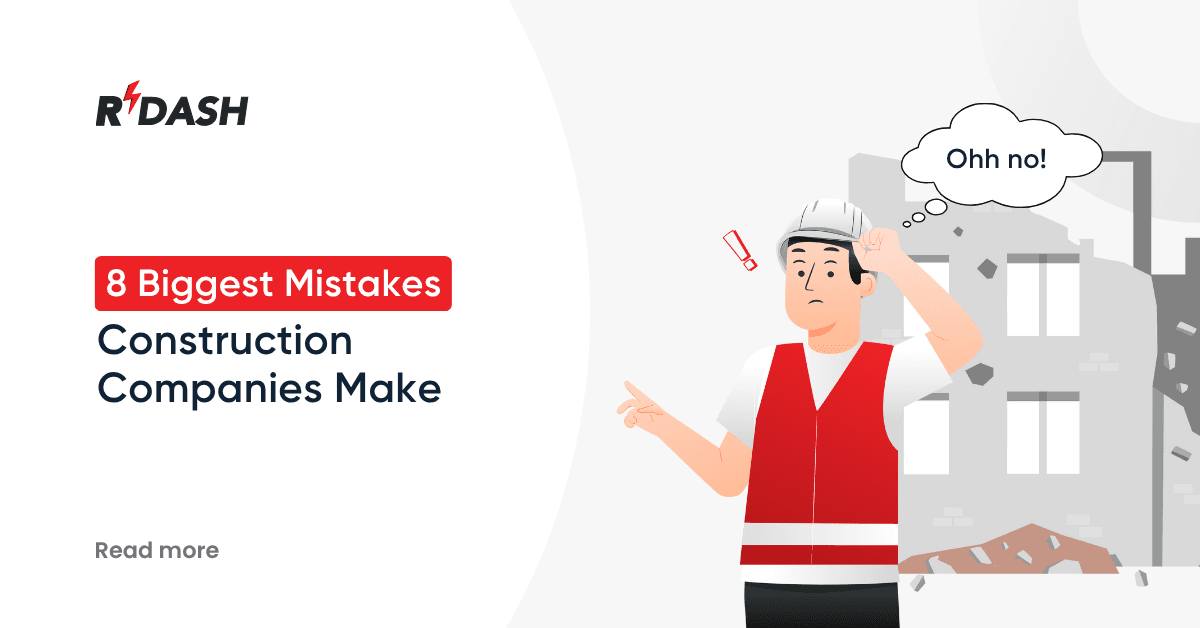8 Biggest Mistakes Construction Companies Make
Construction companies face various challenges, and even experienced contractors can sometimes make mistakes that affect their project timelines, budgets, and overall reputation. These mistakes can lead to cost overruns, delays, and unhappy clients. Below are some of the biggest mistakes that construction companies commonly make:

1. Poor Project Planning
A major mistake construction companies often make is inadequate project planning. Without a proper plan, it’s easy for projects to get off track. Insufficient planning leads to confusion, missed deadlines, and failure to meet client expectations. For example, a lack of planning can lead to scheduling conflicts, inadequate resource allocation, and overlooked legal or regulatory requirements.
2. Failing to Estimate Costs Accurately
Accurate cost estimation is crucial for the success of any construction project. When a construction company fails to estimate costs accurately, it can result in a significant budget shortfall. Underestimating material or labor costs often leads to unexpected expenses. This can cause financial strain and result in delays. Companies might also face difficulty when unexpected costs arise and there’s no financial buffer to address them.
3. Ignoring Safety Protocols
Construction sites are inherently dangerous, and ignoring safety protocols is a grave mistake that can have serious consequences. Not adhering to safety guidelines endangers workers and can lead to accidents, injuries, or even fatalities. Moreover, safety violations can result in legal issues, fines, and damage to the company’s reputation. A lack of emphasis on safety can also lead to significant downtime while investigations and corrective actions are taken.
4. Lack of Communication
Poor communication is another common mistake that often leads to confusion and errors. Construction projects require collaboration among several teams, including architects, engineers, contractors, and subcontractors. When there is a lack of communication, tasks can be misaligned, deadlines can be missed, and errors may go unnoticed. Miscommunication with clients can also lead to misunderstandings about the scope of work or project goals.
5. Failing to Track Progress
Not keeping track of progress is a significant mistake that many construction companies make. Without regularly checking if tasks are completed on time, it becomes easy for the project to fall behind schedule. Missing deadlines and failing to meet milestones can have a domino effect, leading to project delays, budget overruns, and frustration among stakeholders. Failure to monitor progress also means problems may not be detected until they become bigger issues.
6. Poor Subcontractor Management
Mismanaging subcontractors is another common mistake that affects the quality and timeliness of construction projects. Subcontractors are responsible for key parts of the project, and their performance has a direct impact on the final outcome. If subcontractors are not properly vetted or if their performance is not closely monitored, it can result in delays, poor-quality work, or safety violations. Poor management of subcontractor schedules and performance can severely disrupt the project timeline.
7. Not Having Contingency Plans
Construction projects are often affected by unforeseen circumstances, such as weather delays, material shortages, or unexpected site conditions. Companies that fail to have contingency plans for these issues may struggle when things don’t go as expected. Without backup plans in place, companies may face significant delays or increased costs when problems arise. The inability to adapt quickly to changes or unexpected issues can severely affect the project’s success.
8. Poor Client Relationship Management
Mismanaging client relationships can have long-lasting consequences for construction companies. Failing to meet client expectations, not responding promptly to concerns, or neglecting to provide regular updates can lead to dissatisfaction and a damaged reputation. Even if the work is completed to a high standard, poor communication or lack of transparency can lead to mistrust, and clients may not recommend the company for future projects. Additionally, unhappy clients may refuse to pay, leading to financial disputes.
How to Avoid Construction Mistakes
Avoiding common mistakes in construction requires proactive efforts, careful planning, and staying organized throughout the project. Below are key strategies to minimize errors and ensure that construction projects run smoothly:
Invest in Proper Pre-Project Planning
Effective planning sets the foundation for a successful construction project. To avoid mistakes, it is essential to thoroughly define the scope of the project, set realistic timelines, and estimate costs accurately. Planning should also include risk assessments to foresee potential challenges. A well-defined project plan allows for smoother execution and fewer unexpected problems down the line.
Prioritize Accurate Cost Estimation
Underestimating costs can lead to project delays and financial strain. To prevent this, construction companies should use detailed cost estimation processes that include not just materials and labor but also contingency funds for unexpected issues. Re-evaluating costs regularly and updating budgets as the project progresses will help maintain financial control and avoid costly mistakes.
Focus on Safety and Compliance
Construction is inherently risky, and failure to follow safety protocols can result in accidents, injuries, and legal consequences. To avoid safety mistakes, it is crucial to conduct regular safety training, enforce the use of protective equipment, and ensure all workers understand and adhere to safety guidelines. Compliance with local and national safety regulations should always be a priority to protect the workforce and reduce costly accidents.
Establish Clear Communication Channels
Poor communication can lead to confusion, errors, and delays. Ensure that all project stakeholders, including contractors, subcontractors, and clients, have open and clear communication. Regular meetings and real-time updates will help everyone stay aligned on goals, timelines, and changes. Tools such as project management software can streamline communication and keep everyone on the same page.
Regularly Monitor and Track Project Progress
Regular tracking of project milestones ensures the work stays on schedule and within budget. By monitoring progress consistently, project managers can identify delays or issues early, making it easier to address them before they become bigger problems. Frequent checks will also ensure that the project meets quality standards and aligns with the initial plan.
Manage Subcontractors Effectively
Subcontractors play a crucial role in construction projects, but their work can sometimes cause delays or quality issues if not properly managed. To avoid mistakes, ensure that subcontractors understand the project requirements, timelines, and quality standards. Regularly reviewing their work and providing clear instructions will help maintain efficiency and prevent misunderstandings.
Be Prepared for Unexpected Events
Construction projects are often impacted by unexpected factors, such as bad weather, supply shortages, or regulatory changes. To avoid mistakes when these events arise, companies should develop contingency plans that include alternative suppliers, additional resources, or temporary solutions to continue work without significant delays.
Build and Maintain Strong Client Relationships
Client satisfaction is key to long-term success in construction. To avoid issues with clients, it’s important to communicate regularly about the project’s progress, address concerns promptly, and manage expectations realistically. Keeping the client informed of any delays or changes will help maintain trust and prevent misunderstandings.
Review and Inspect Work Thoroughly
Before moving to the next phase of construction, ensure that work is double-checked for accuracy. Inspections should focus on quality control, ensuring that work is completed to the correct specifications. Identifying mistakes early reduces the risk of costly rework and ensures the project stays on schedule.
Use Technology to Enhance Efficiency
Incorporating technology into construction projects can help reduce errors and increase efficiency. Project management software like RDash, real-time tracking tools, and digital communication platforms help streamline operations, track progress, and identify potential issues faster. The use of technology helps keep the project on track and ensures better decision-making throughout the project.






